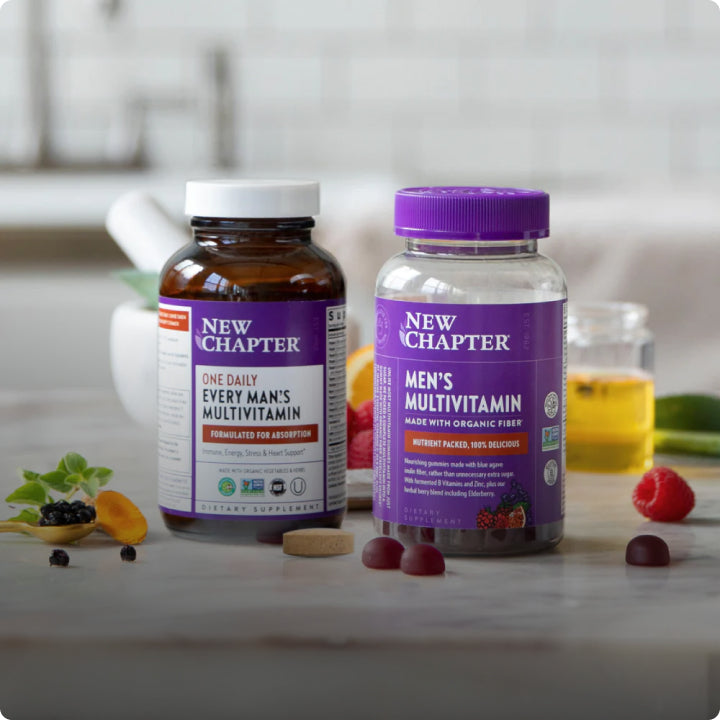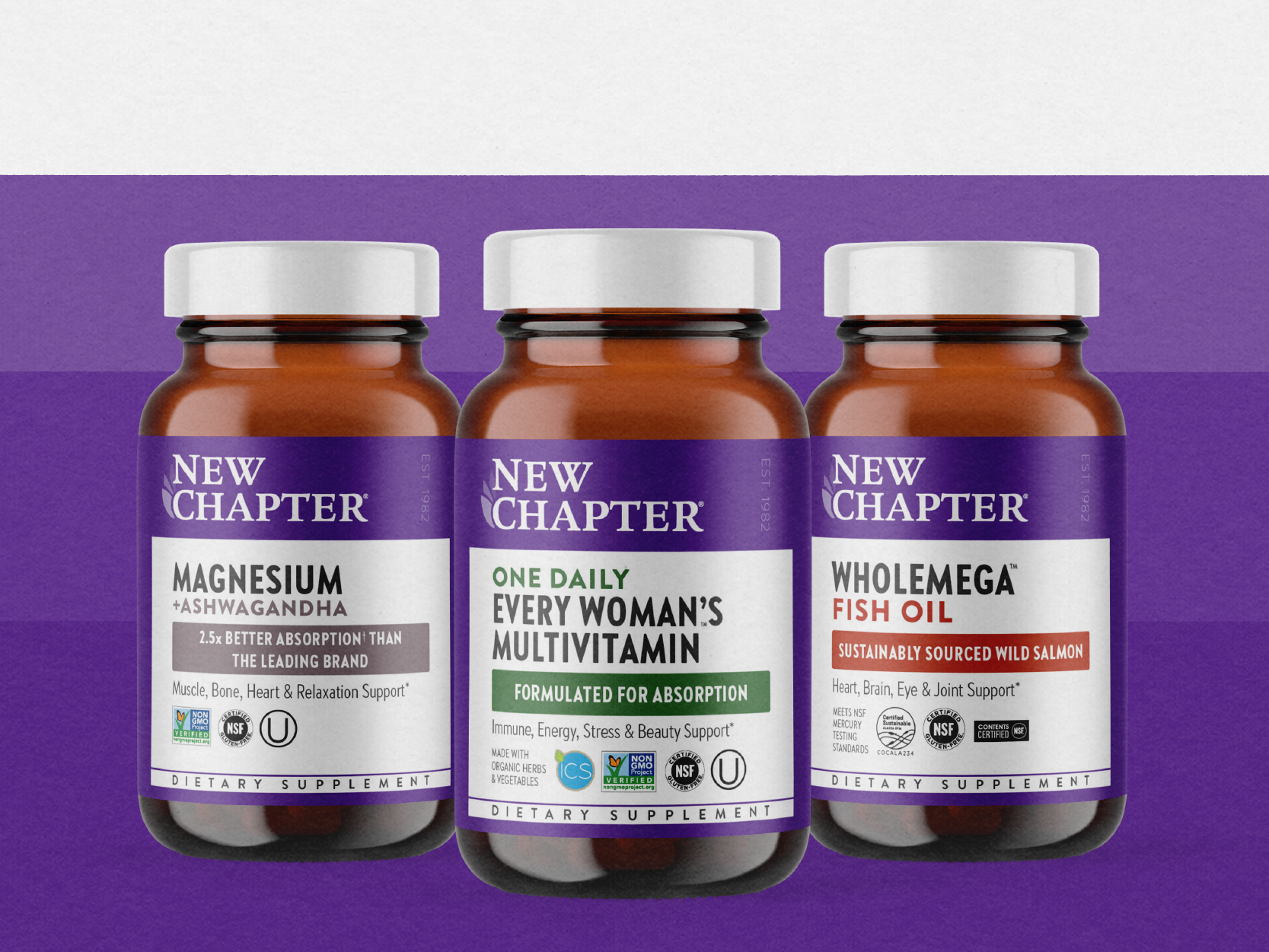Methylfolate vs. Fermented Folic Acid in Prenatal Vitamins
New Chapter ® makes high-quality supplements for pregnant and nursing women, so we get plenty of questions about Folate vs Methylfolate vs Folic Acid. What are they? How are they similar? What should you look for? To help answer these questions and get peace of mind that you’re giving your body and baby the very best, let’s take a closer look at this nutrient of many names.
What is in a Prenatal Vitamin?
Questions about Folate usually come up when researching prenatal vitamins. Prenatal vitamins or multivitamins are targeted blends of nutrients recommended for women who may become pregnant or are already pregnant. These formulas are crafted to help prepare the body for pregnancy and support mom and baby throughout the whole 9+ months until birth. Many women continue taking their prenatals even after their baby is born, to keep getting those reliable, essential nutrients. (If you want a postnatal multivitamin tailored for your changing needs , our Perfect Postnatal™ multi is made for you!)
New Chapter’s top-of-the-line prenatal multivitamins are formulated for absorption and provide excellent sources † of the following 20 nutrients:
- Vitamin A
- Vitamin C
- Vitamin D3
- Vitamin E
- Vitamin K
- 8 B Vitamins (Thiamin, Riboflavin, Niacin, Vitamin B6, Vitamin B12, Biotin, Pantothenic Acid, and Folate as Folic Acid and/or Methylfolate)
- Iron
- Iodine
- Zinc
- Selenium
- Copper
- Manganese
- Chromium
Folic Acid Benefits
Folic Acid is a form of a B Vitamin (Vitamin B9) that the body uses to make new cells. It’s essential for proper early neural tube development in babies, particularly in the first 28 days after conception. Having adequate Folic Acid at this point supports the baby’s healthy brain and spine development. Since most women don’t know they’re pregnant until at least 2 weeks after conception, taking Folic Acid regularly before pregnancy can help avoid this gap. The Centers for Disease Control and Prevention recommend that anyone who could become pregnant take 400 mcg of Folic Acid each day, as well as eating foods with Folate.
What is Methylfolate?

So, what is Methylfolate, and how does it relate to Folate vs Folic Acid? In general, “Folate” can refer to any and all forms of B9. It’s often broken down into three types:
- Natural Folate is the form of B9 found in food, such as dark, leafy greens.
- Folic Acid is the form of B9 used in many supplements, as well as in fortified foods like enriched pasta, bread, or breakfast cereals.
- Methylfolate is the form of B9 that the body actually uses. Both Folic Acid and Folate convert to Methylfolate.
This means that no matter what form of B9 you consume in foods or supplements, your body converts it to use as Methylfolate. This also means that Methylfolate is gaining popularity as a supplement ingredient. While many people can adequately convert Folate or Folic Acid for their B9 needs, there are certain individuals who convert Folic Acid or Folate into Methylfolate more slowly, or sometimes not at all, due to a common gene variant . These individuals may wish to take supplements with Methylfolate, the most bioactive form of Folate, to meet their B9 needs. Methylfolate supplements may also be labeled as 5-methyl-TF, 5-MTHF, or L-methylfolate. New Chapter’s One Daily Prenatal multivitamins are made with this form to deliver Methylfolate benefits.
What is Fermented Folic Acid?
At New Chapter, we are firm believers in the value of fermenting certain nutrients in a super-broth of live probiotics and whole foods to unlock and activate them for your body. Folic Acid is one of these. Fermenting helps deliver Folic Acid in the context of complex food that the body can recognize and use. For this reason, New Chapter’s Advanced Perfect Prenatal™ multivitamin and our Every Woman™’s One Daily multivitamin are formulated with fermented Folic Acid as well as with Methylfolate.
Healthy Foods That Are High in Folate
As mentioned above, many foods contain a natural form of Folate. If you’re interested in getting more B9 from food, here are some Folate-rich heavy-hitters!

- Spinach
- Brussels sprouts
- Asparagus
- Legumes such as edamame, black-eyed peas, green peas, kidney beans, and peanuts
- Avocado
- Broccoli
- Mustard greens or turnip greens, cooked
- Lettuce
- Bananas
- Oranges
- Cantaloupe
Nutrition references: National Institutes of Health, Cleveland Clinic
How Much Folic Acid Should You Take?
In general, daily recommendations for B9 are expressed as micrograms (mcg) of dietary folate equivalents (DFE). The micrograms of DFE are calculated depending on whether the source is Folate or Folic Acid. The best way to check your intake is to read Supplement Facts panels and Nutrition Facts panels to compare DFE amounts.
| Age or Stage | Recommended Daily Amounts |
| Adults (19+ Years) | 400 mcg DFE |
| Pregnant Women | 600 mcg DFE |
| Breastfeeding Women | 500 mcg DFE |
The Bottom Line
If you’re thinking of becoming pregnant or could become pregnant, find out about taking prenatal vitamins with methylfolate or folic acid now to help support your body’s levels at the time of conception. Talk to your healthcare professional about the right sources of Folate and Folic Acid for you. Read the supplement facts to see what type of Folate is in your multivitamin. Our prenatal multis are formulated with Vitamin B9 for your body to recognize and use—so you’re getting the good stuff for you and your baby.

† Excellent source is defined as a nutrient delivering more than 20% Daily Value






